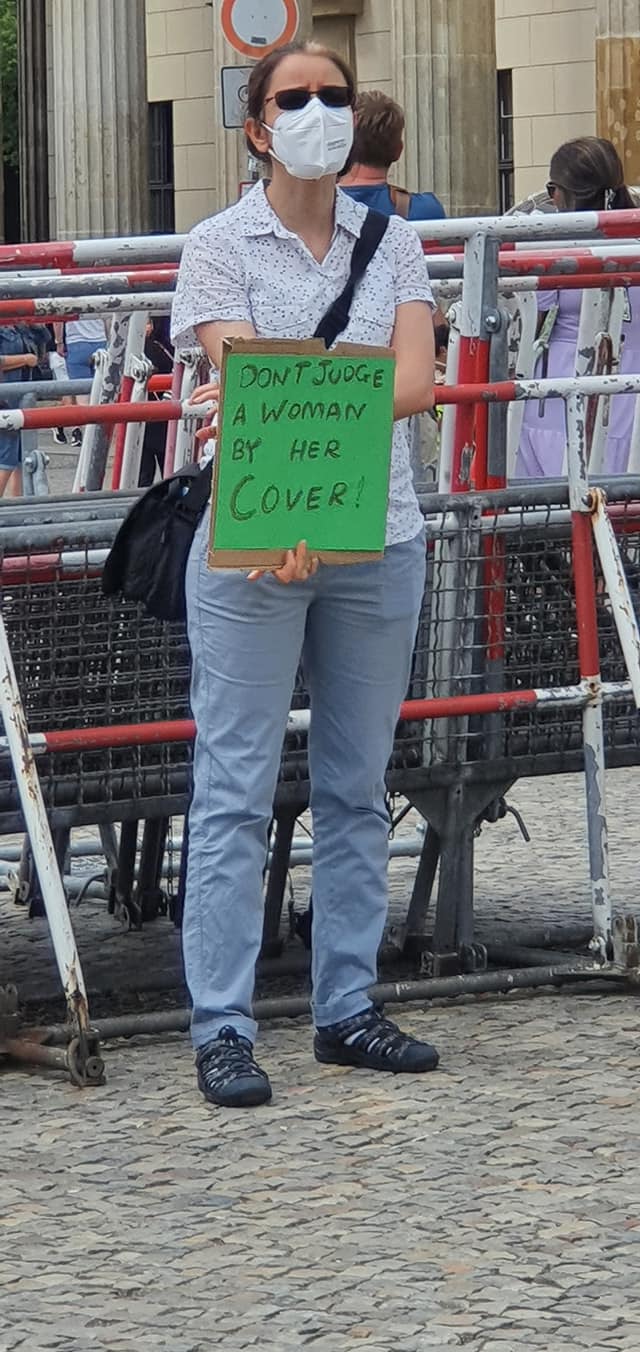
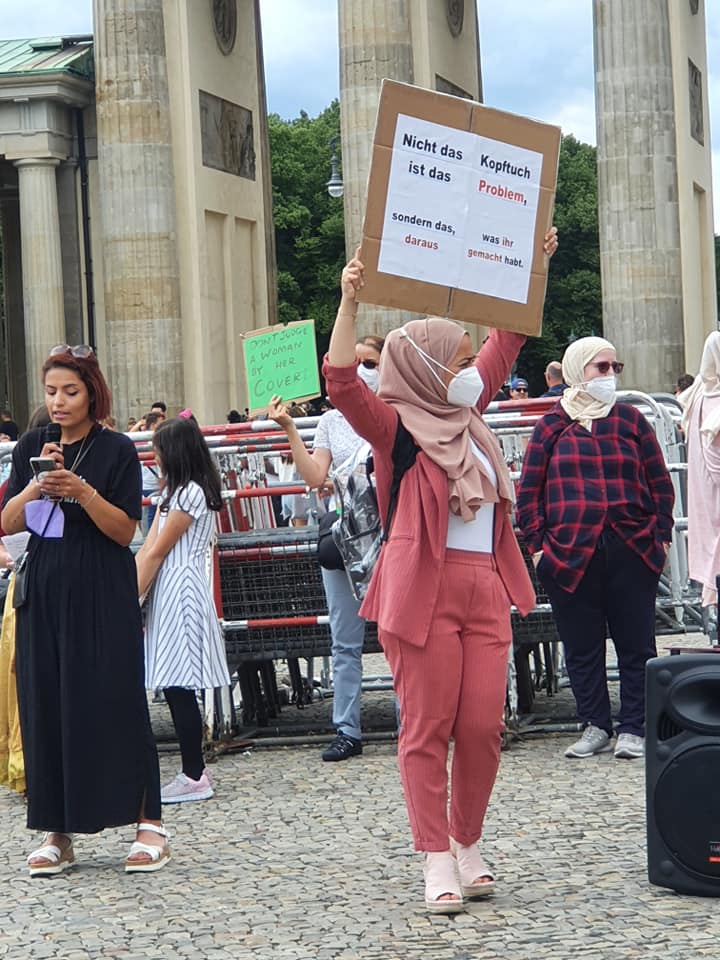
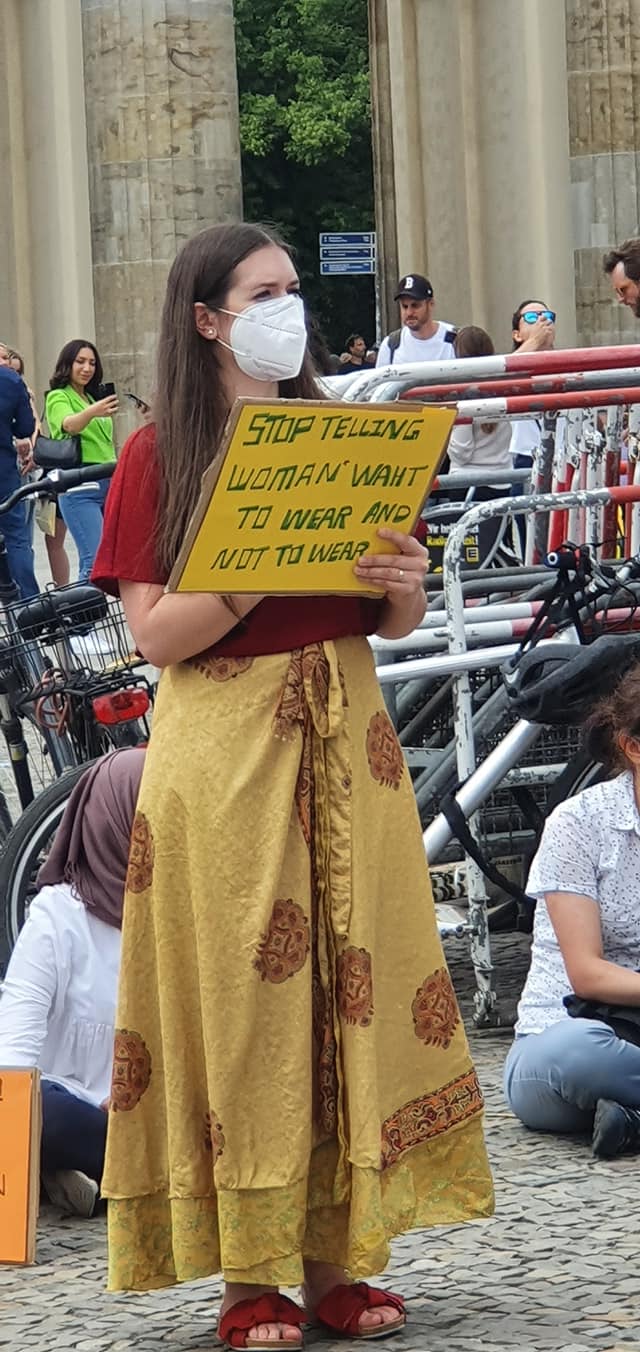
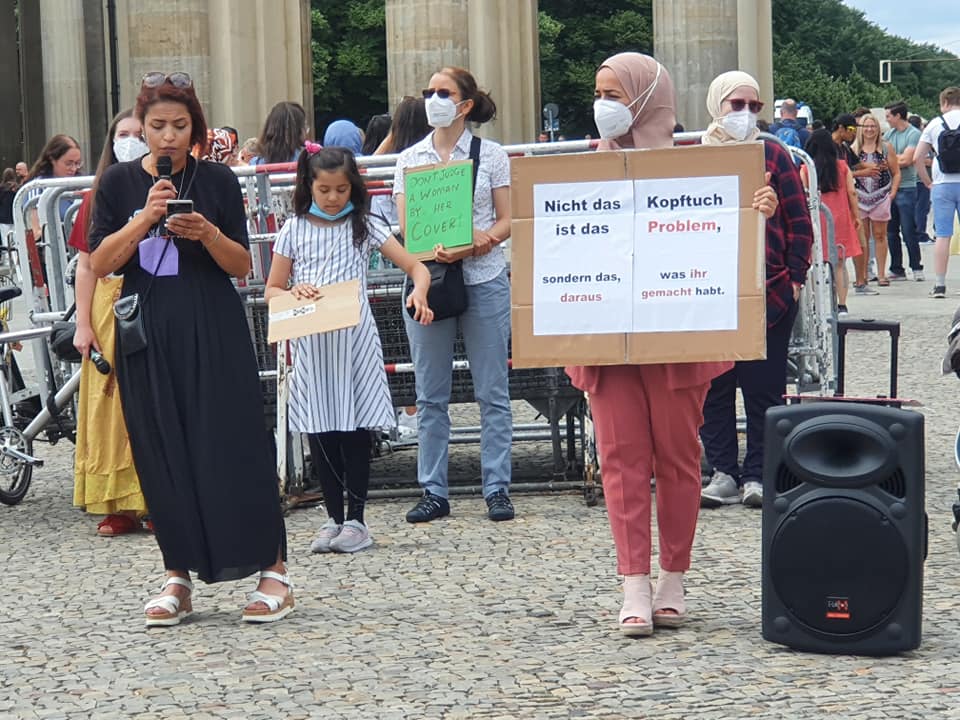
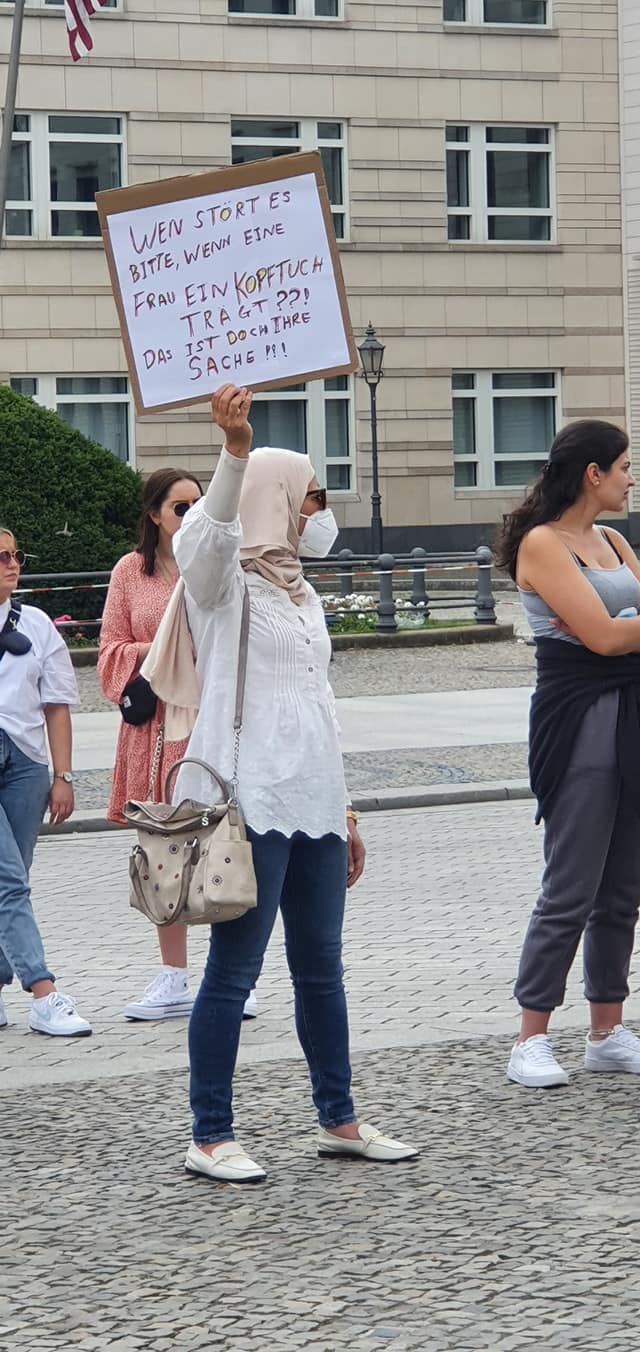
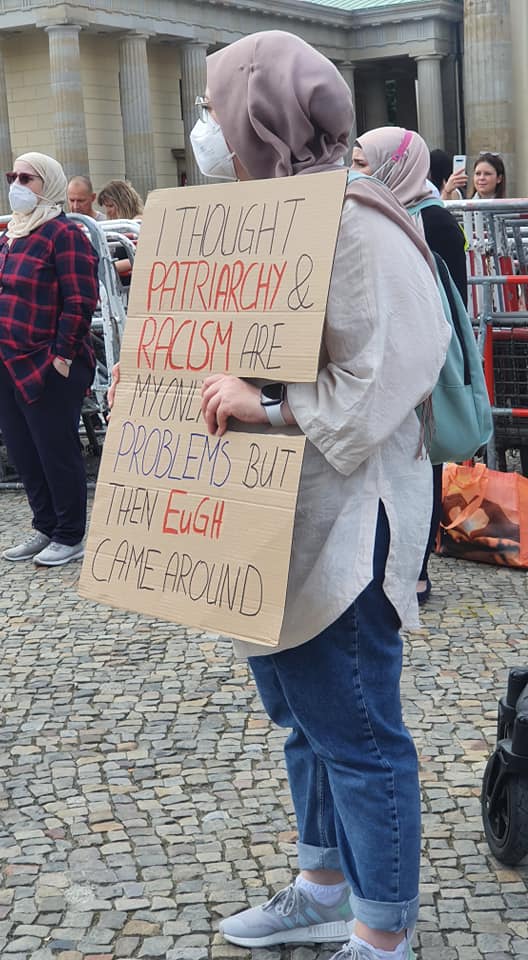
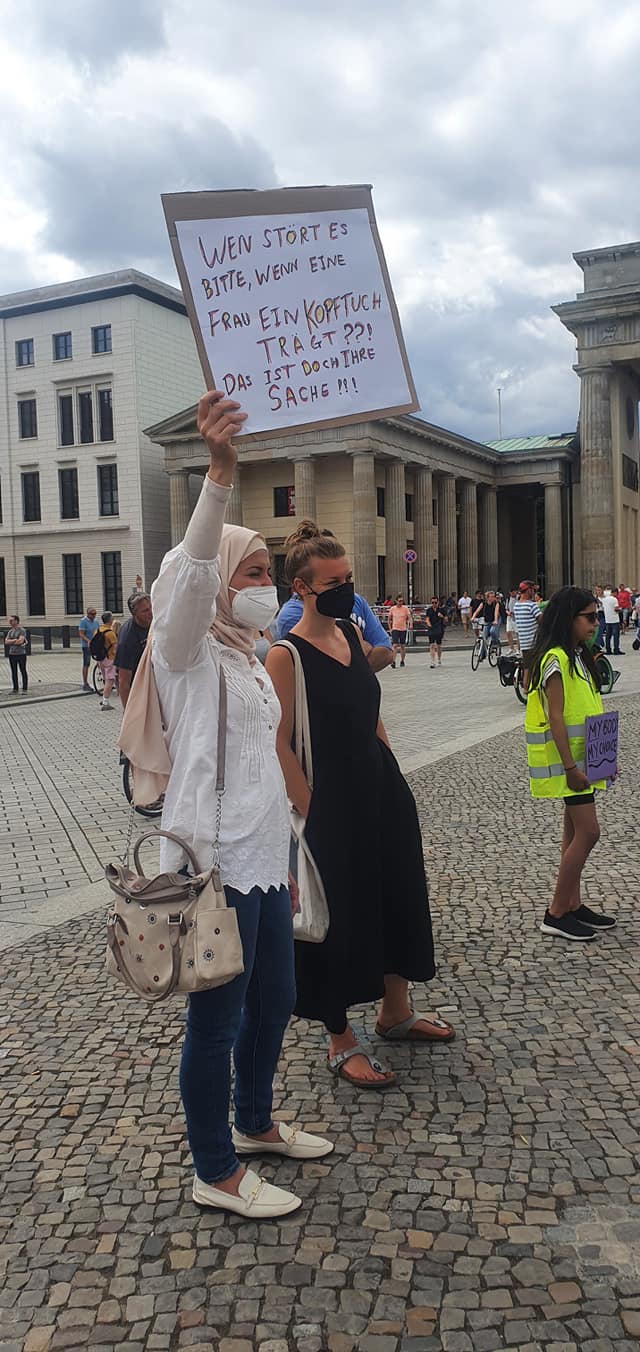
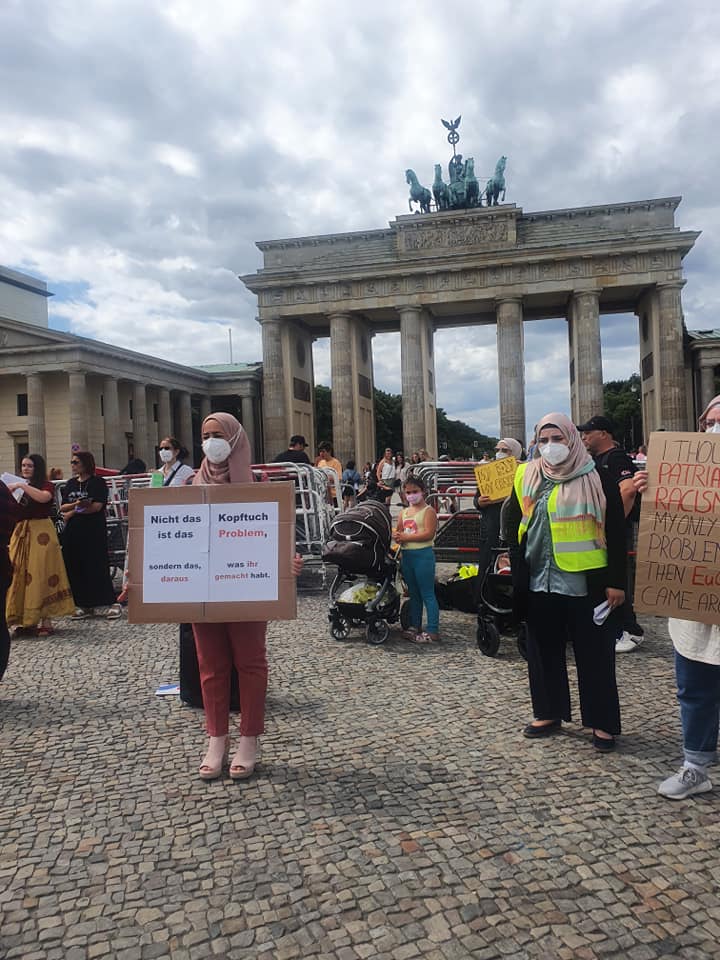
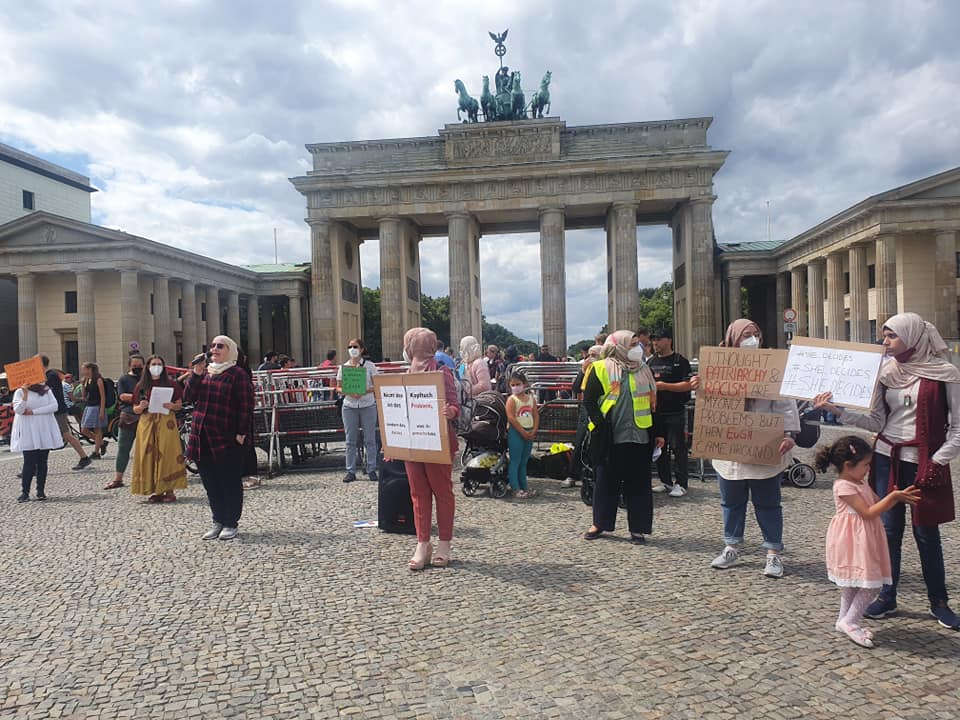
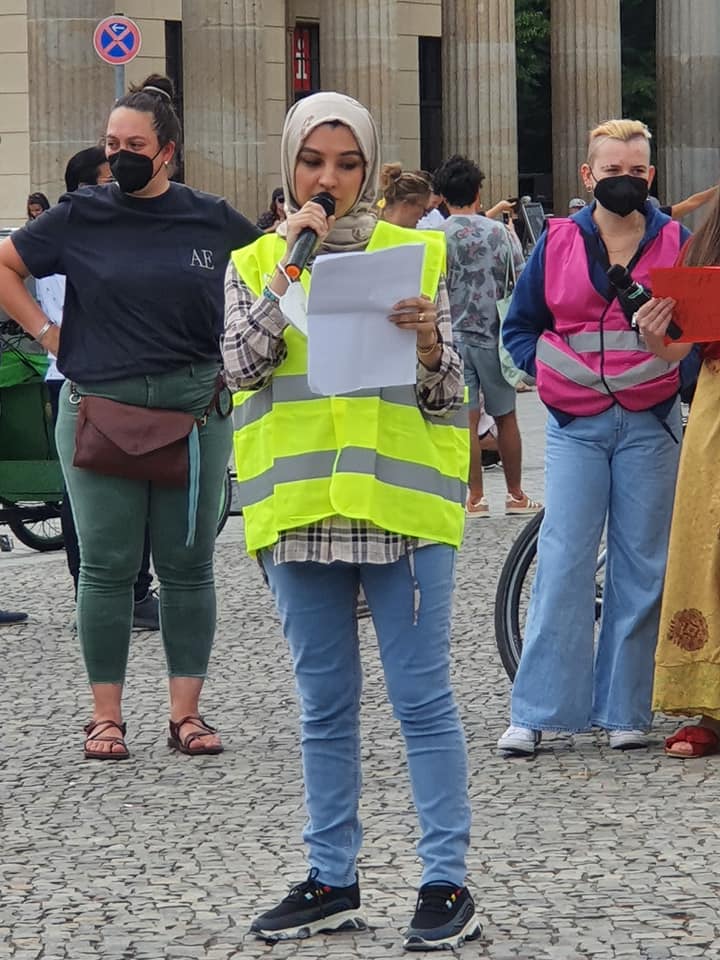
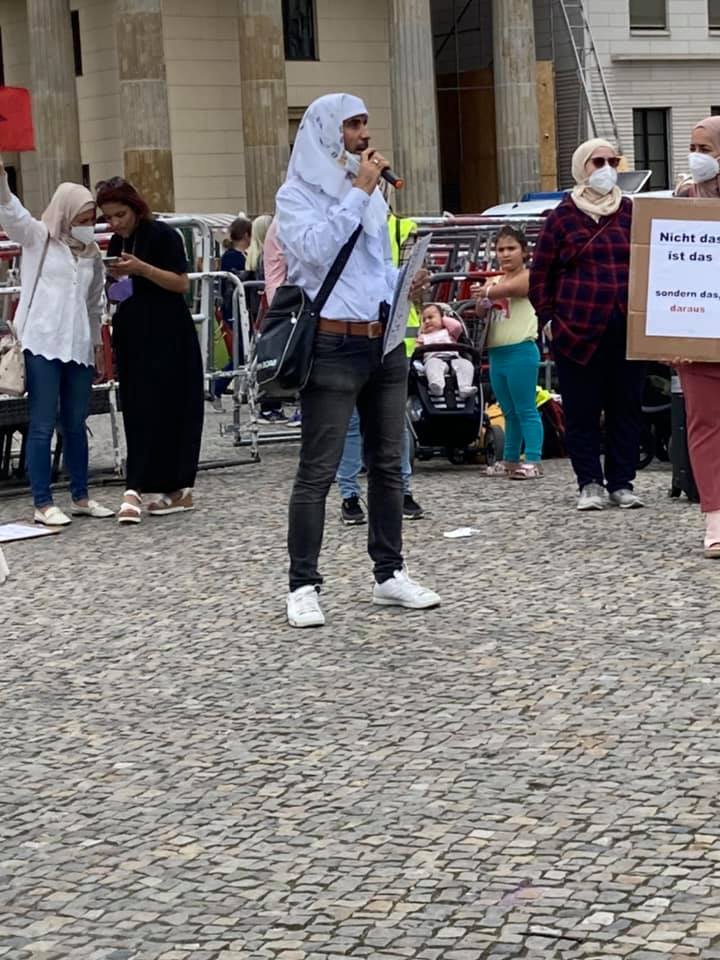
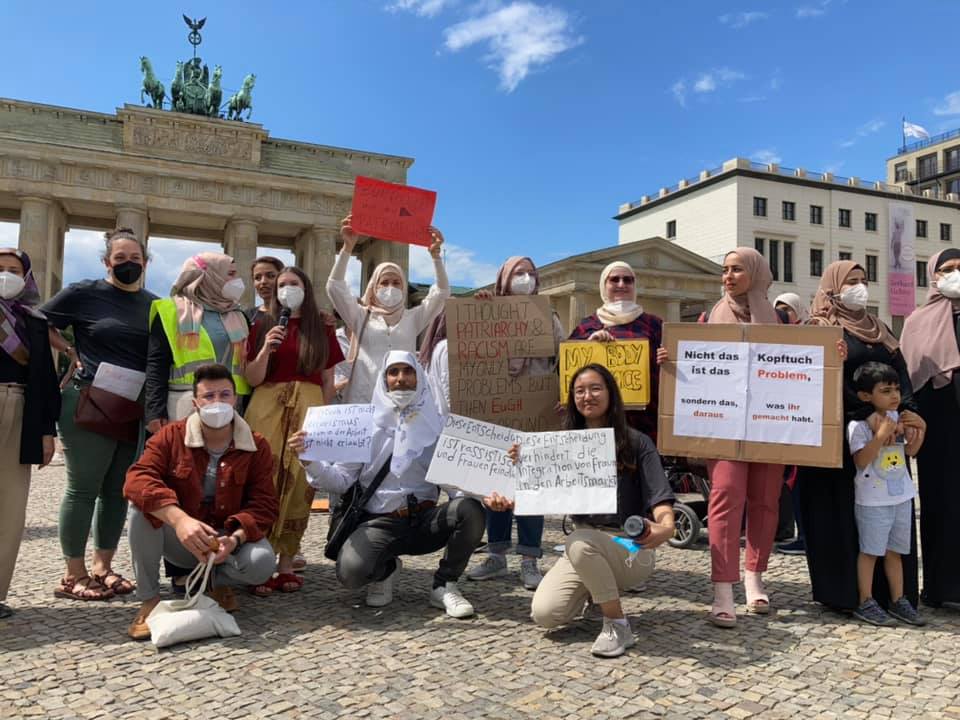
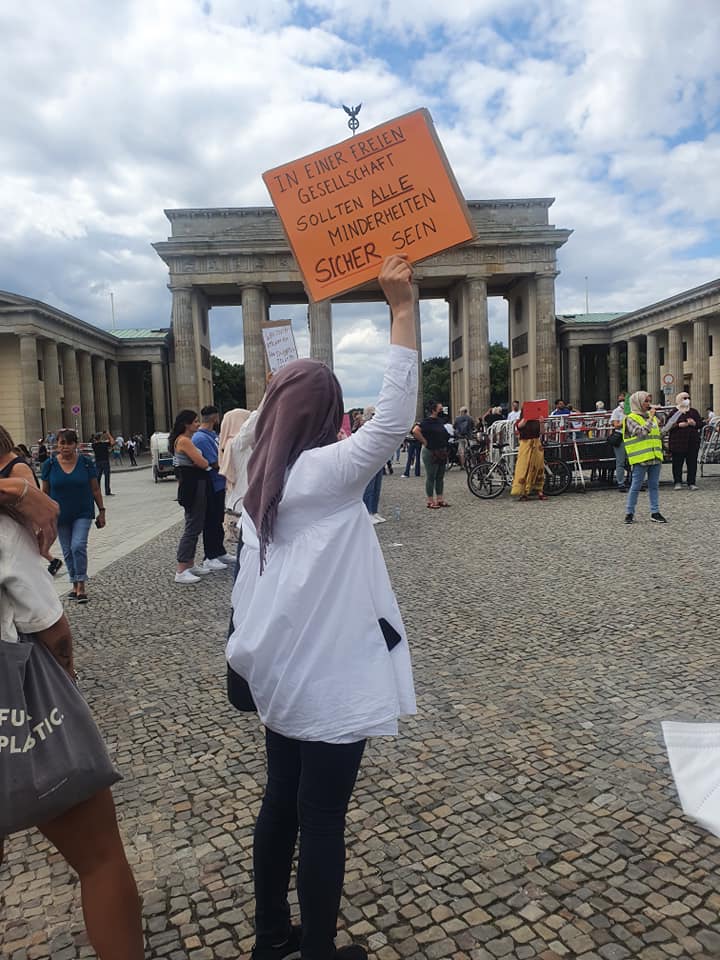
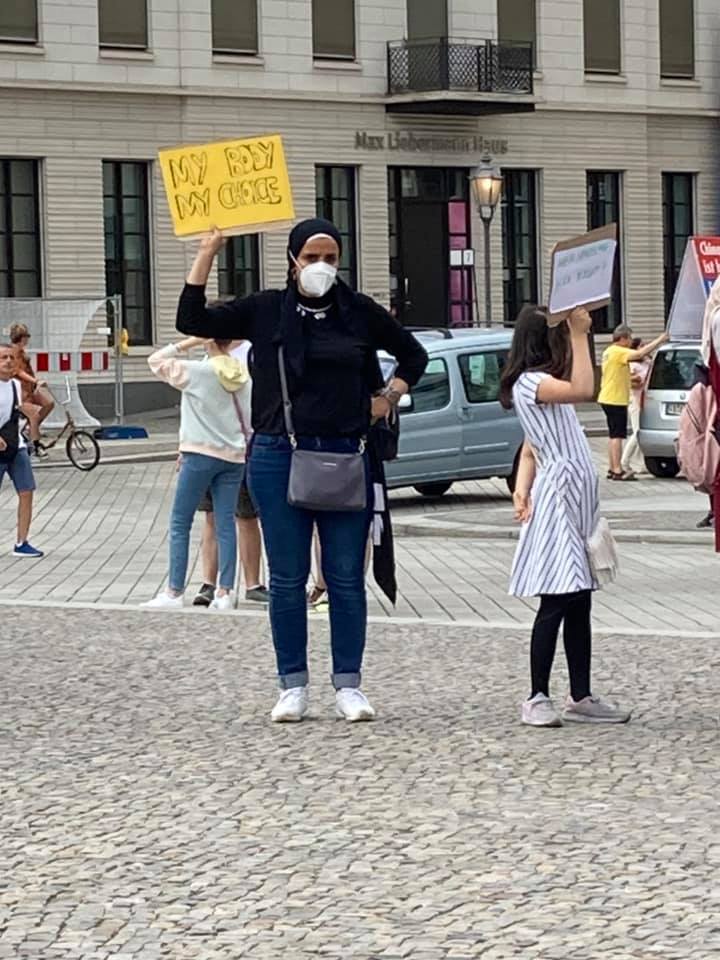
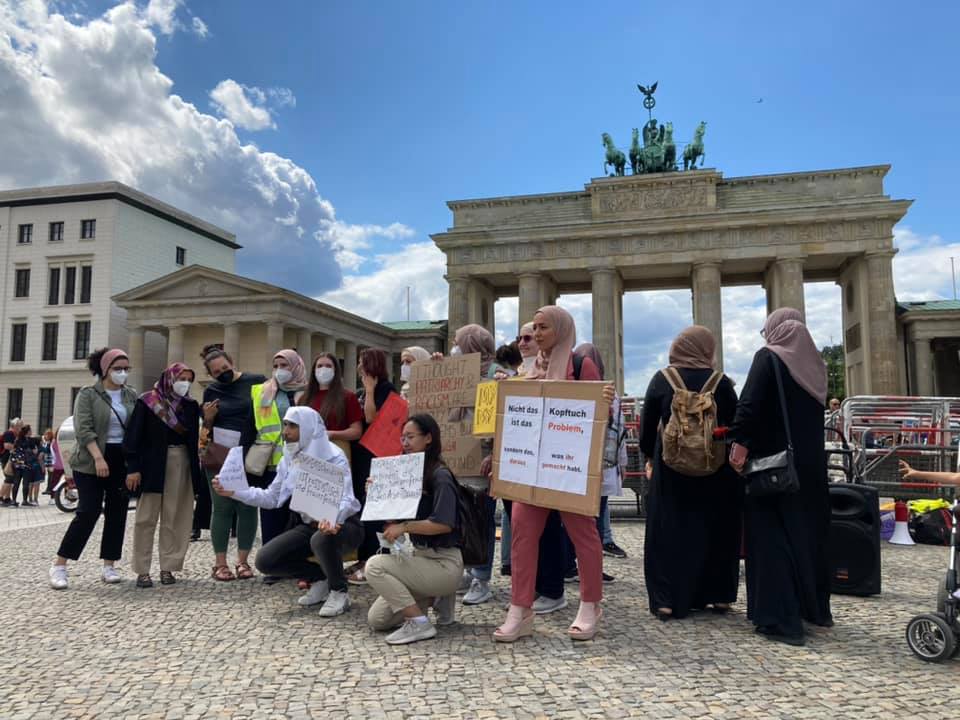
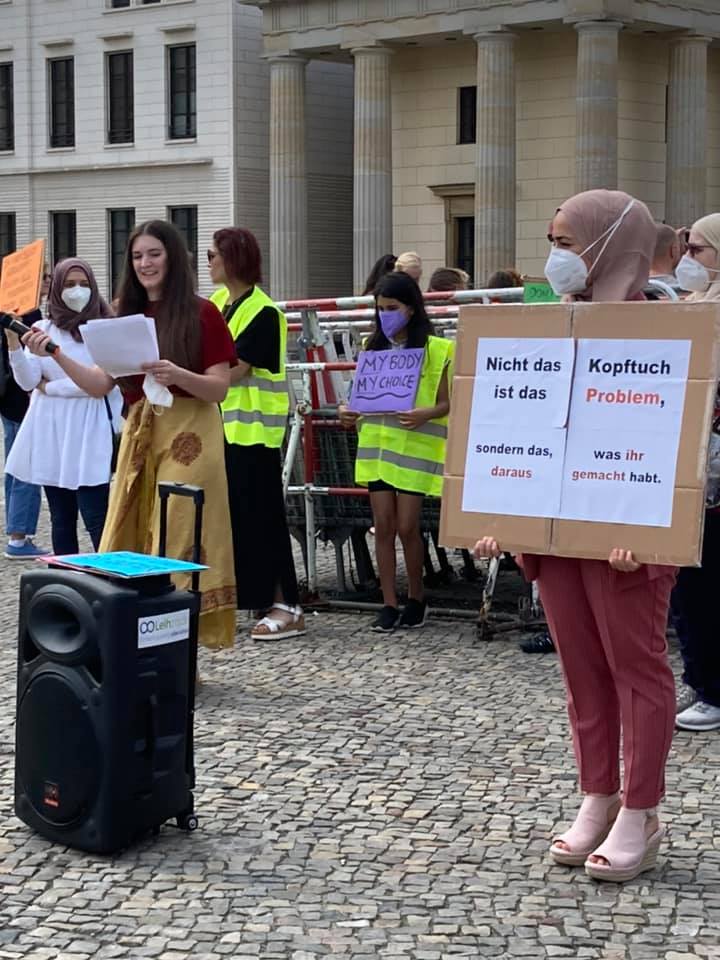
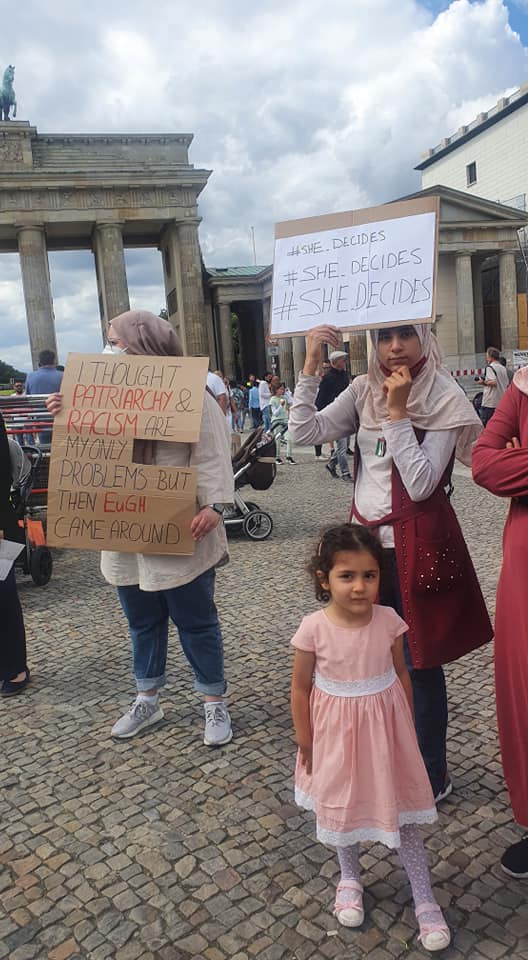

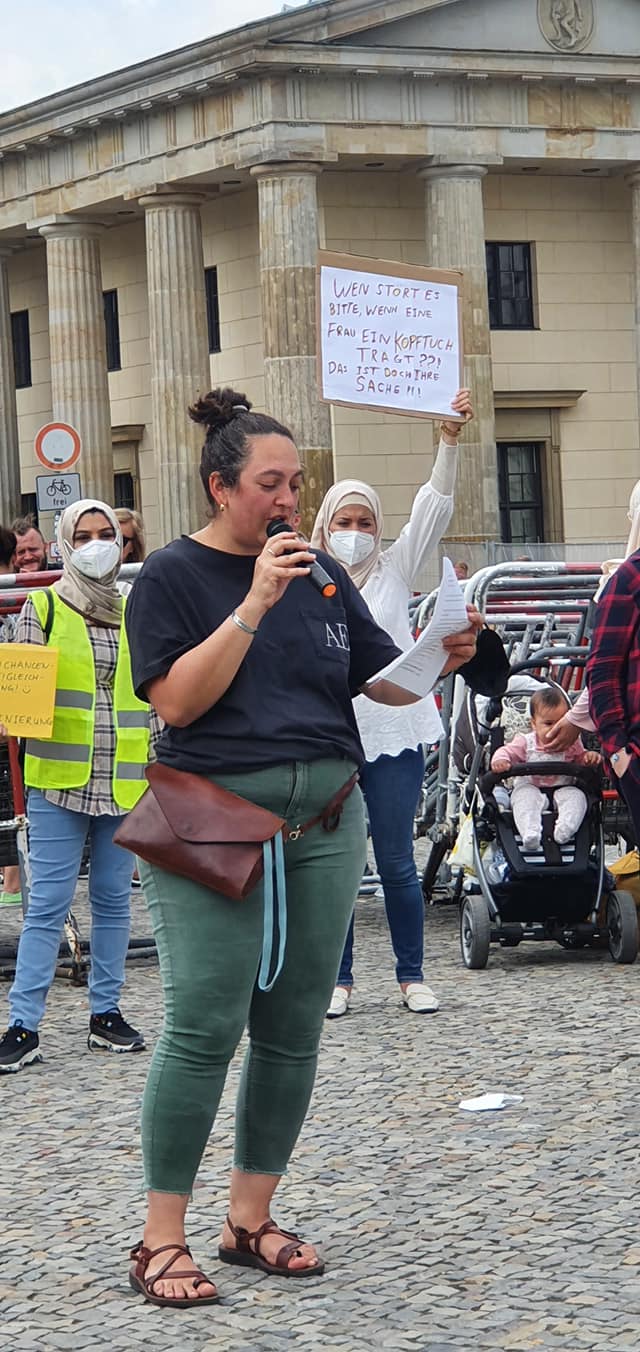
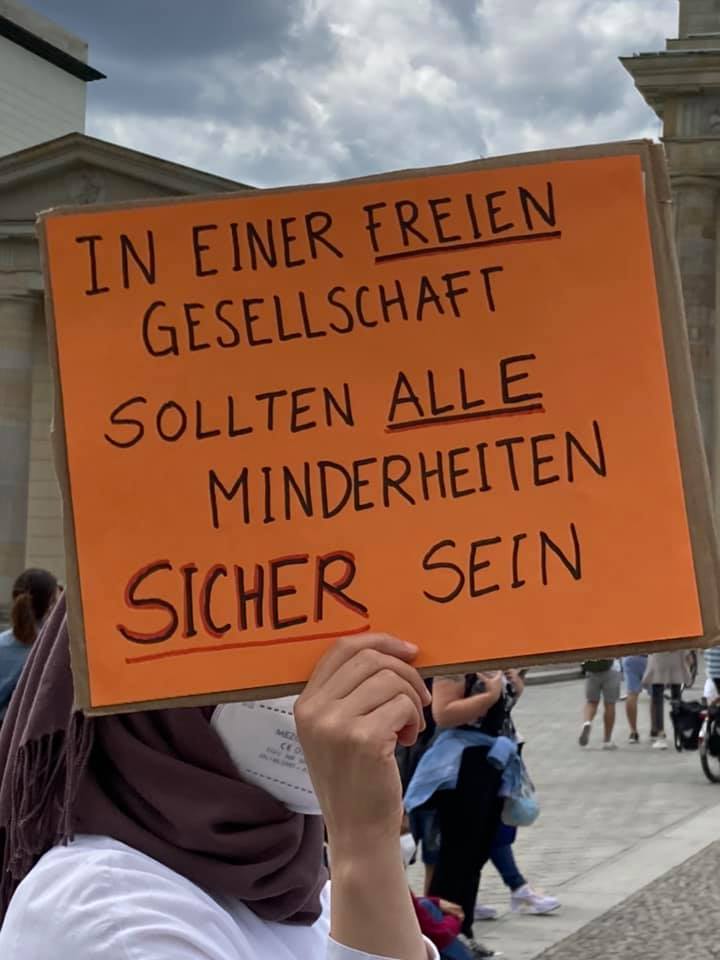
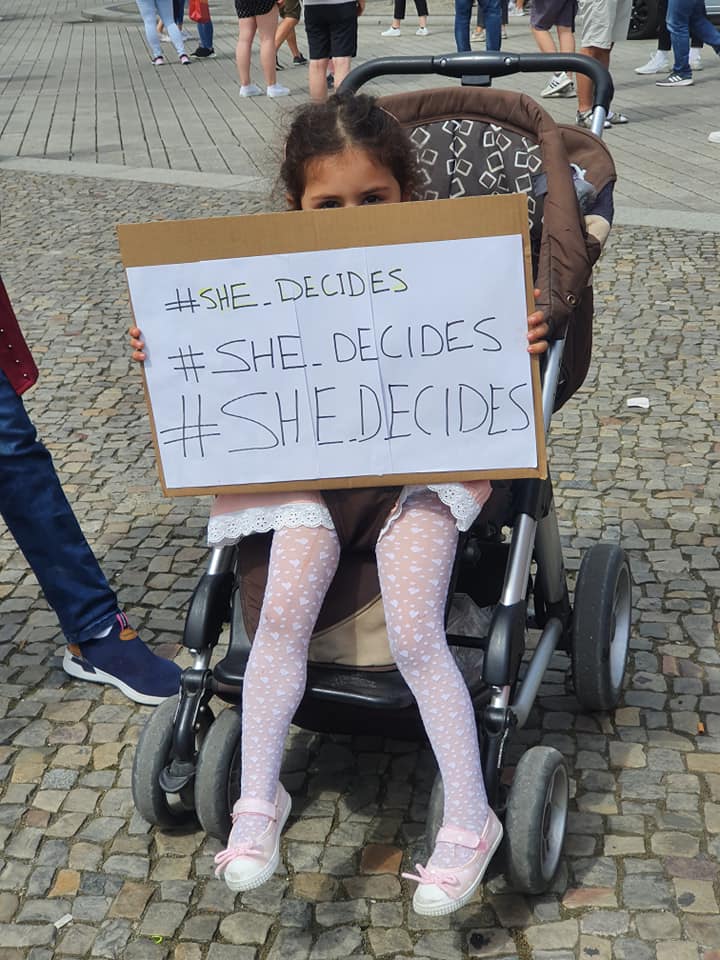
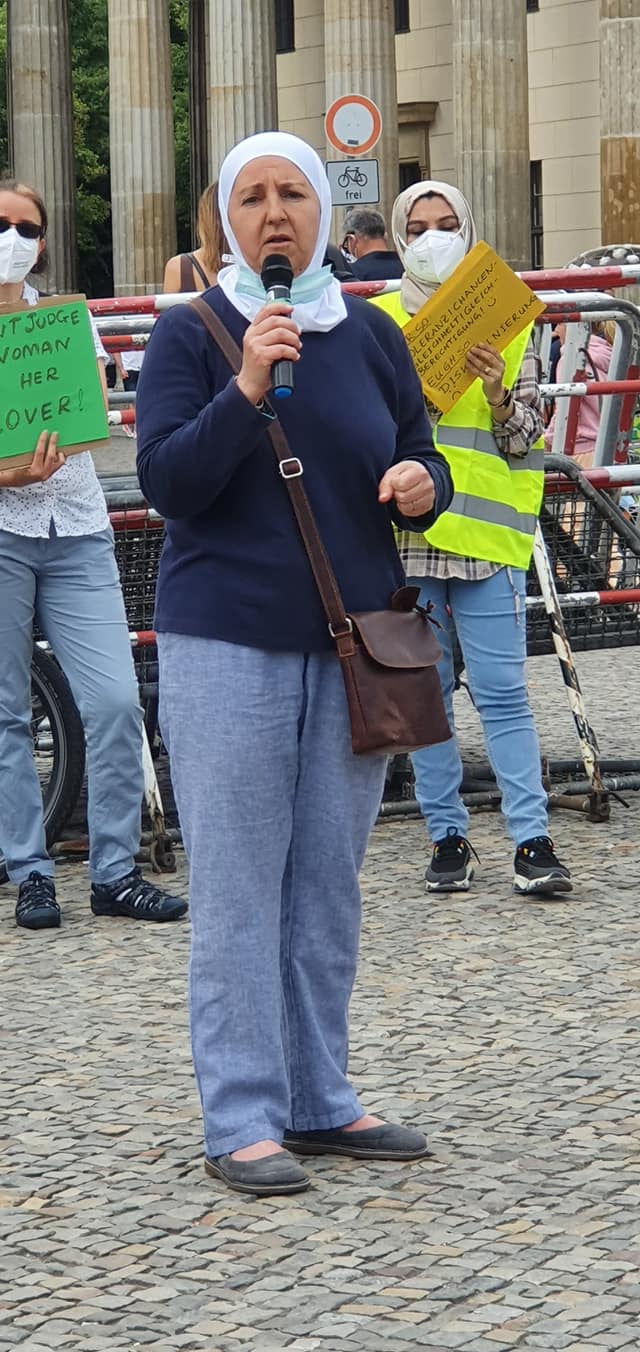
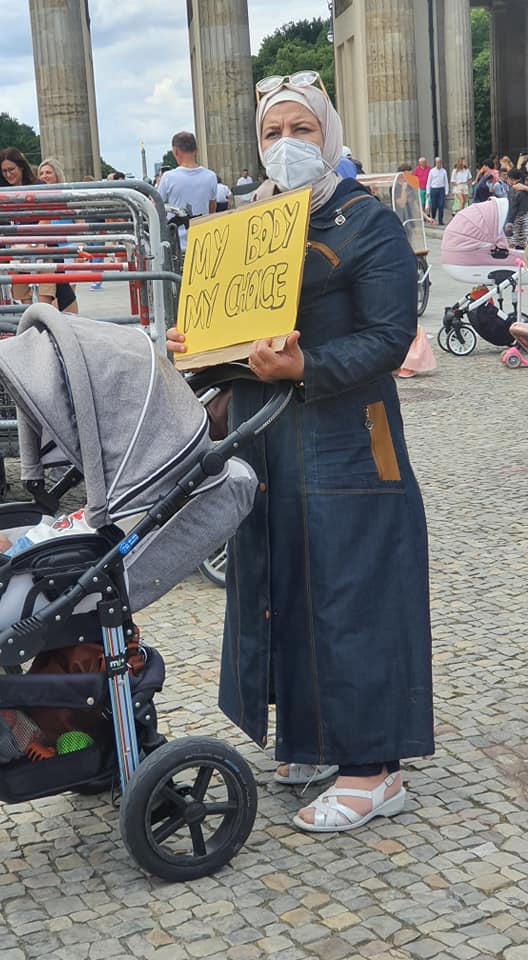
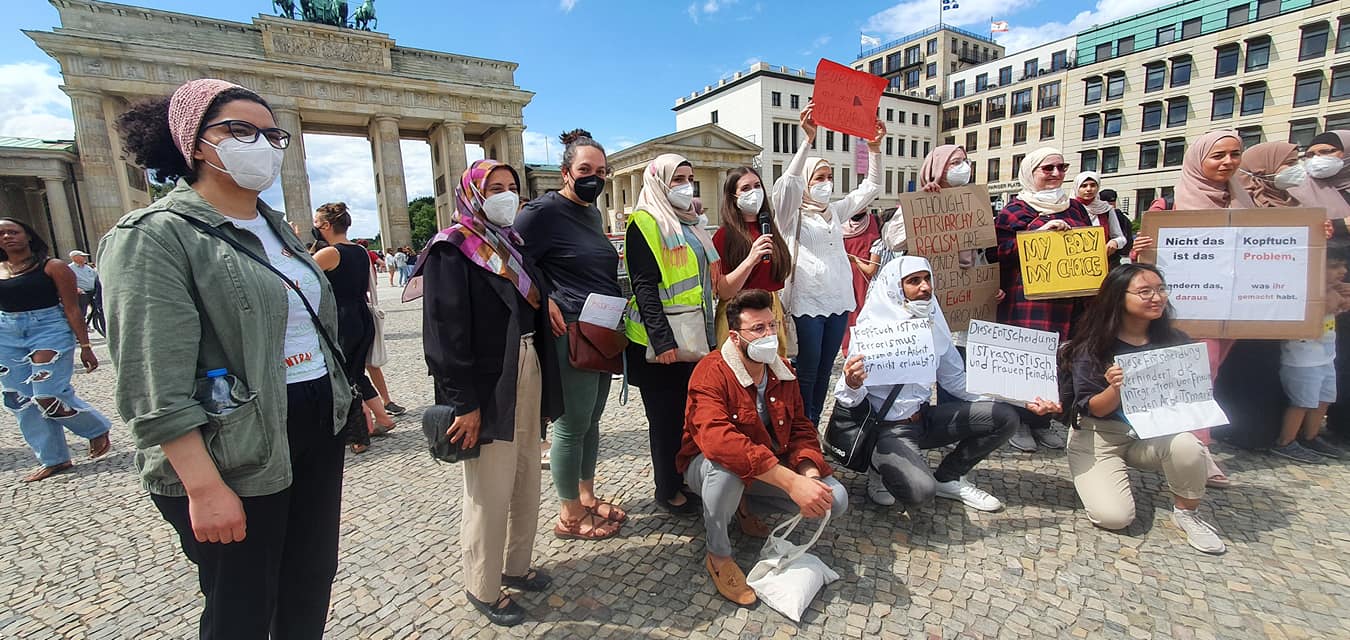
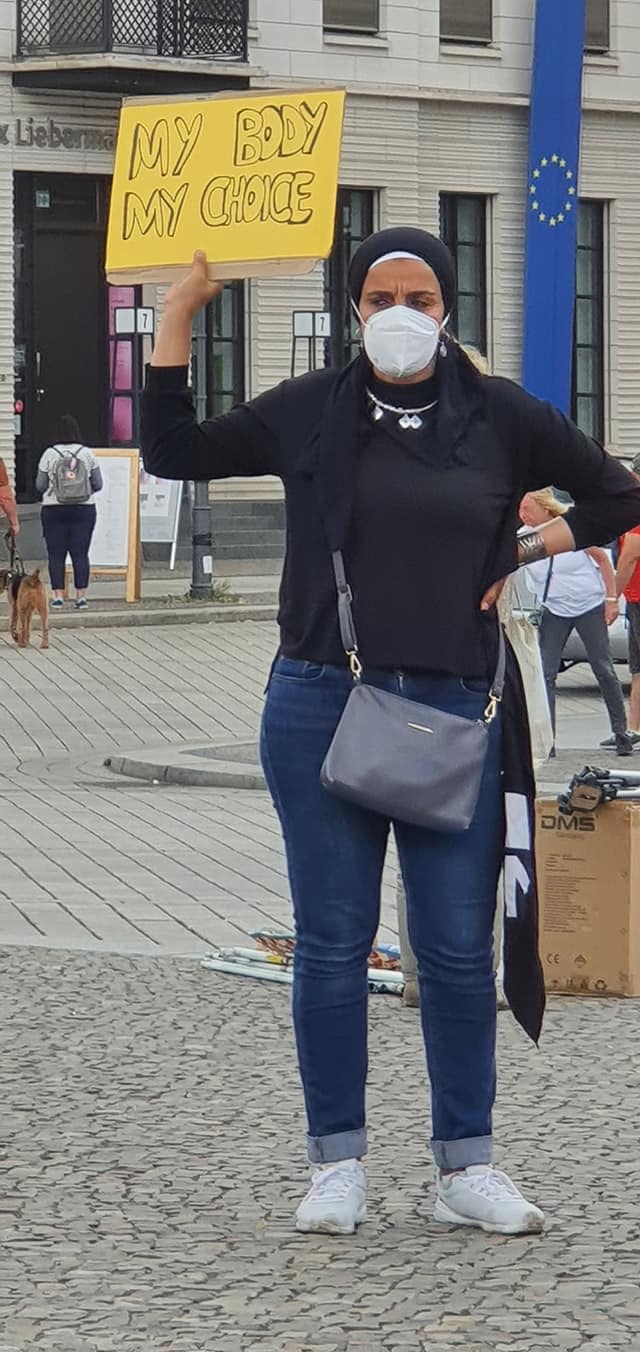
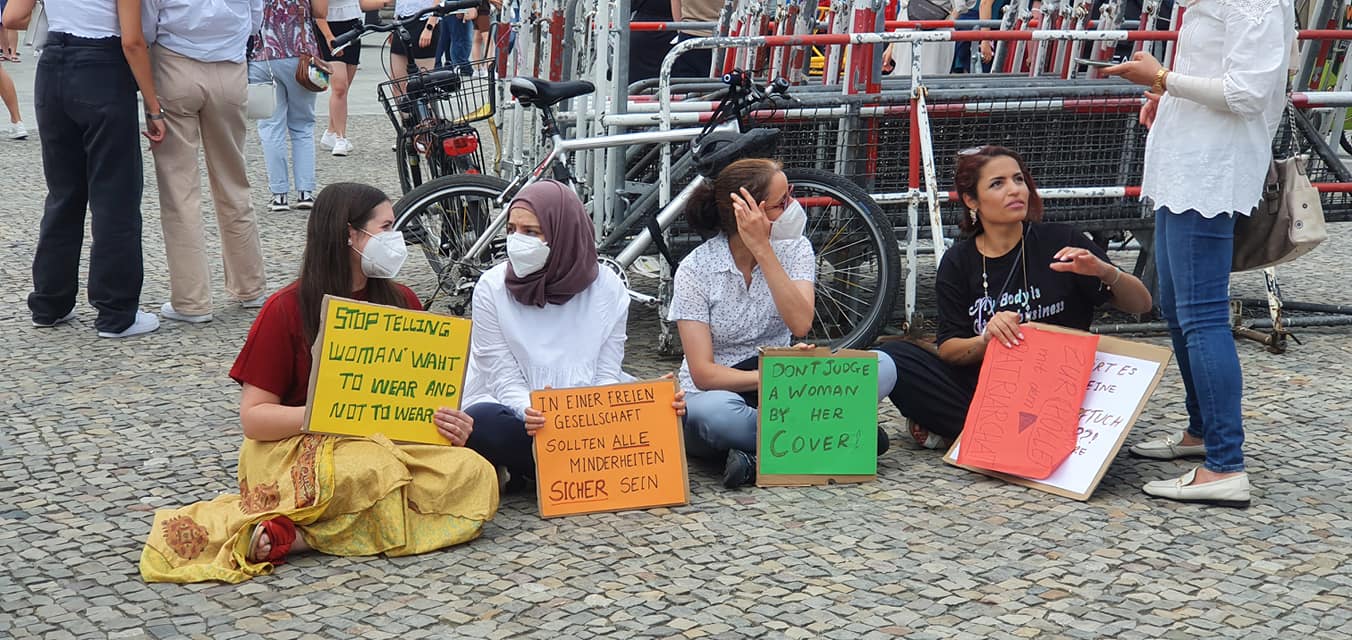
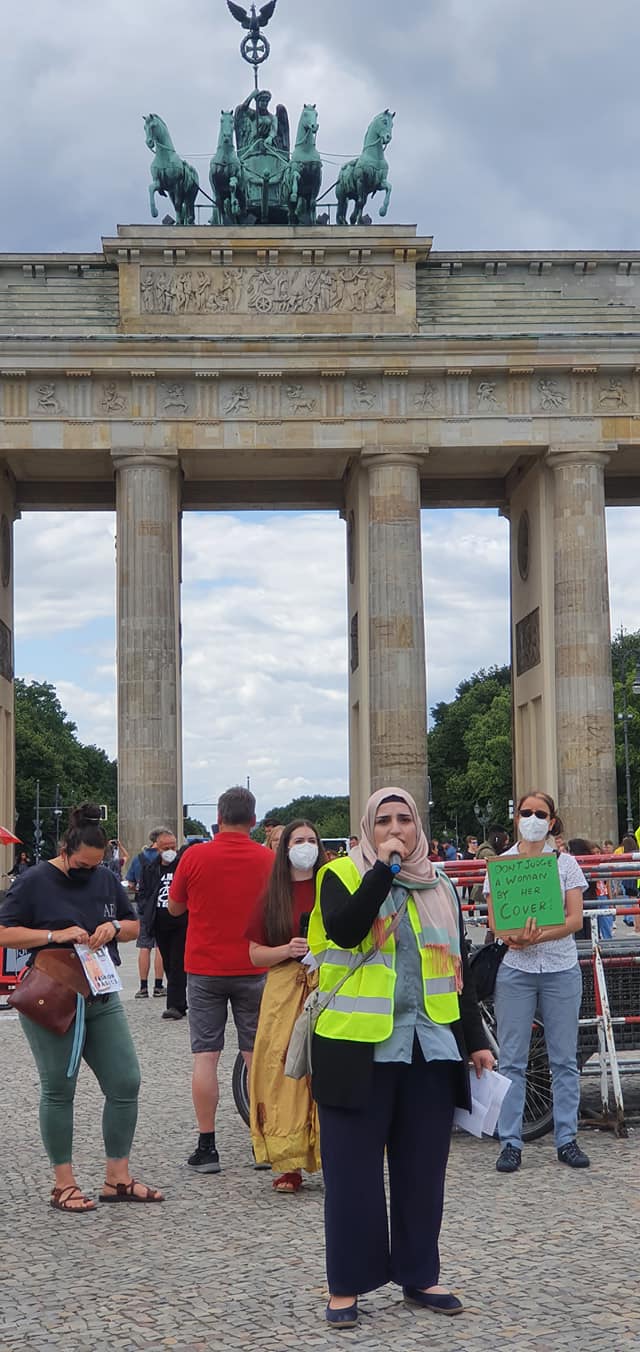
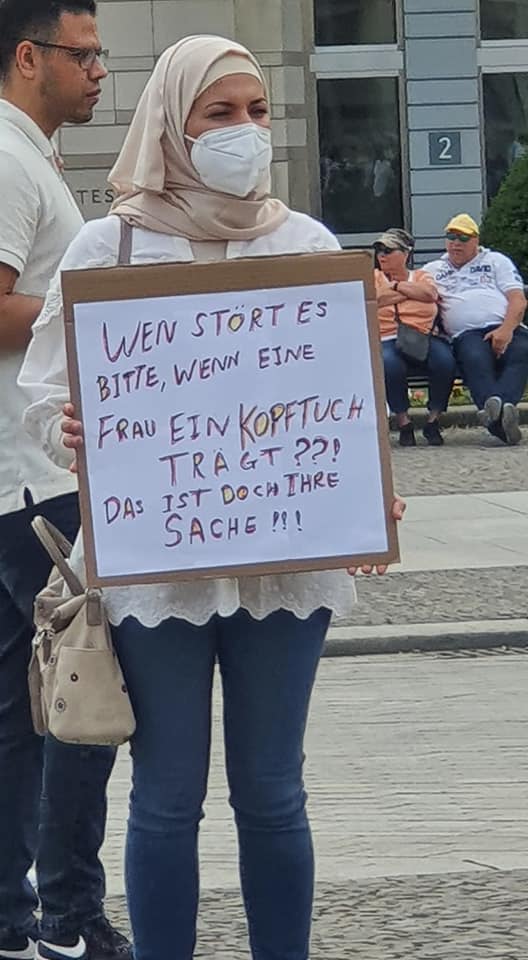
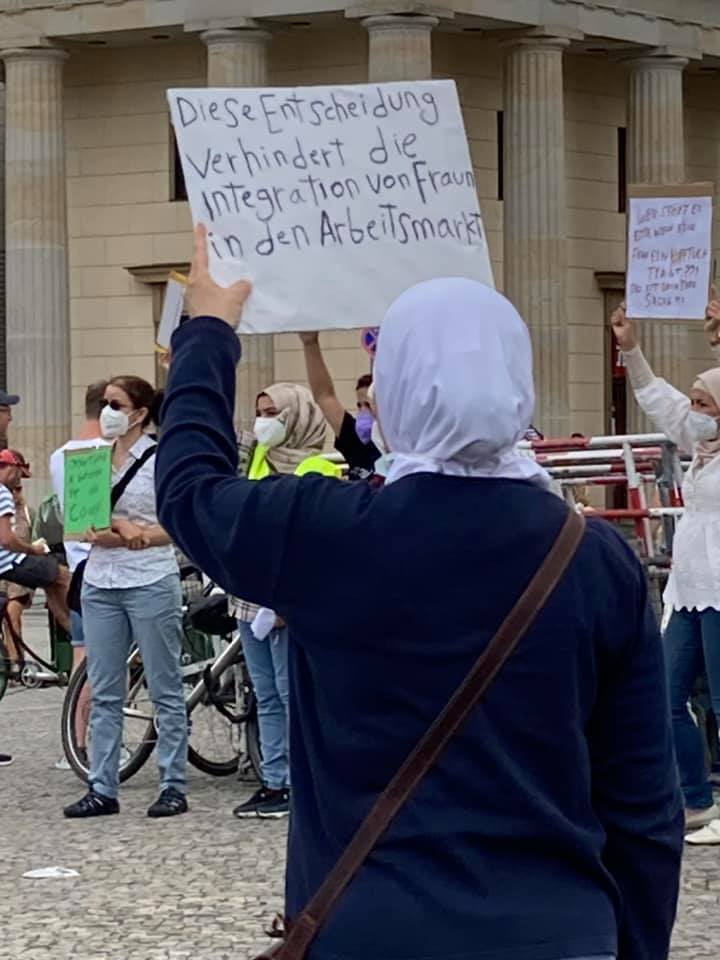
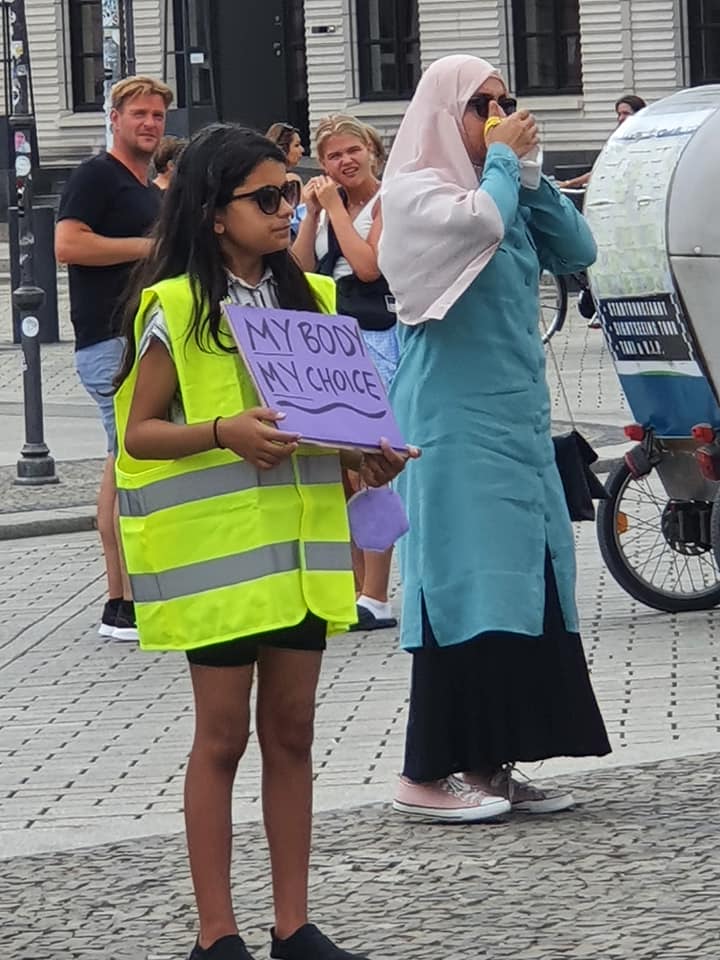
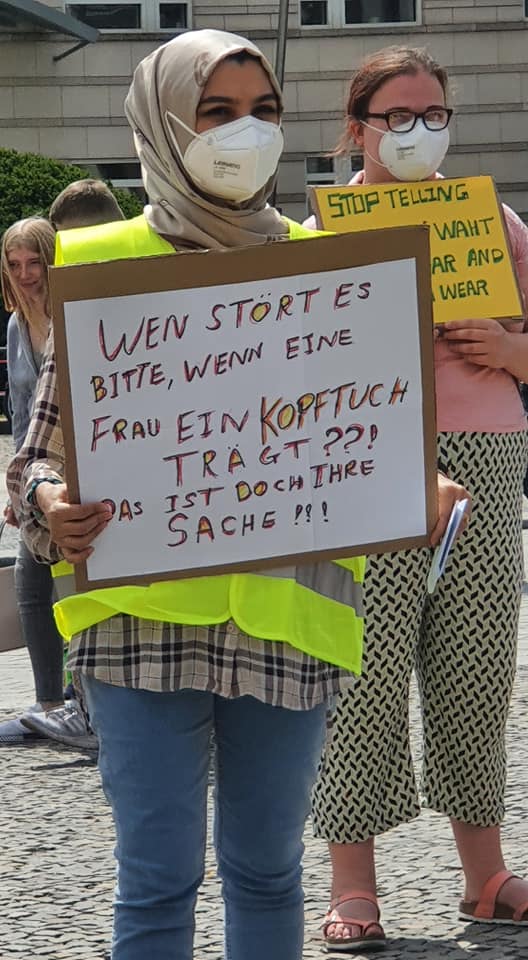
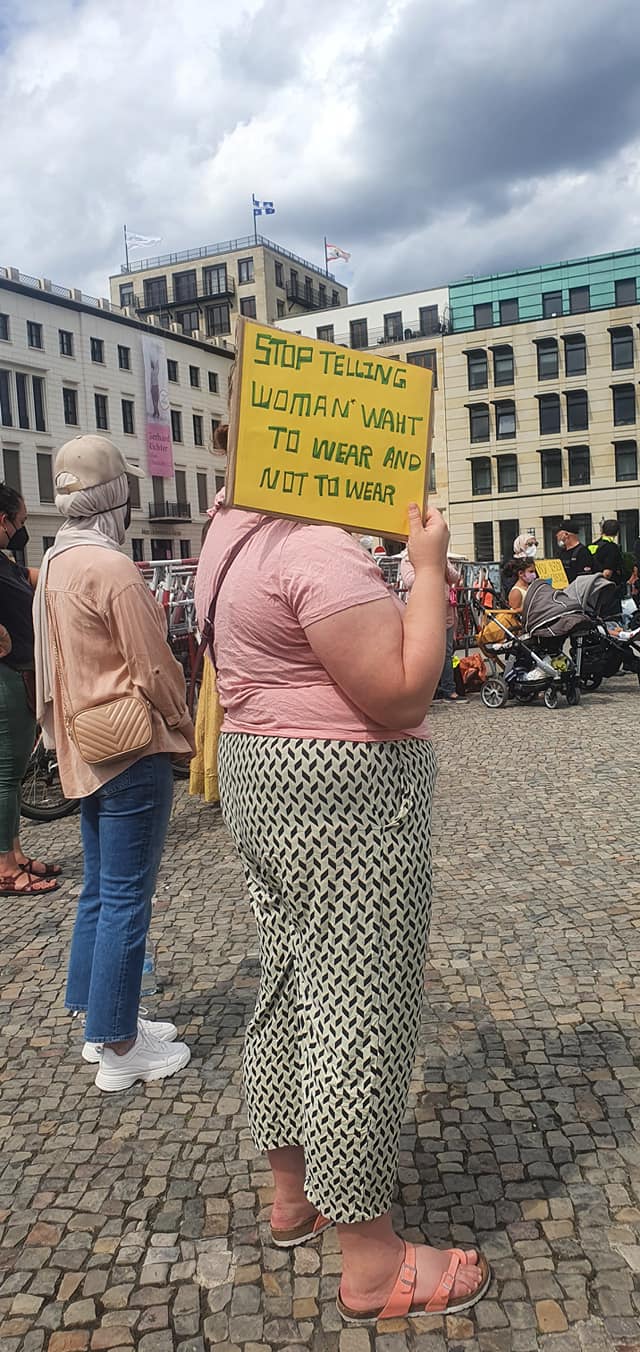

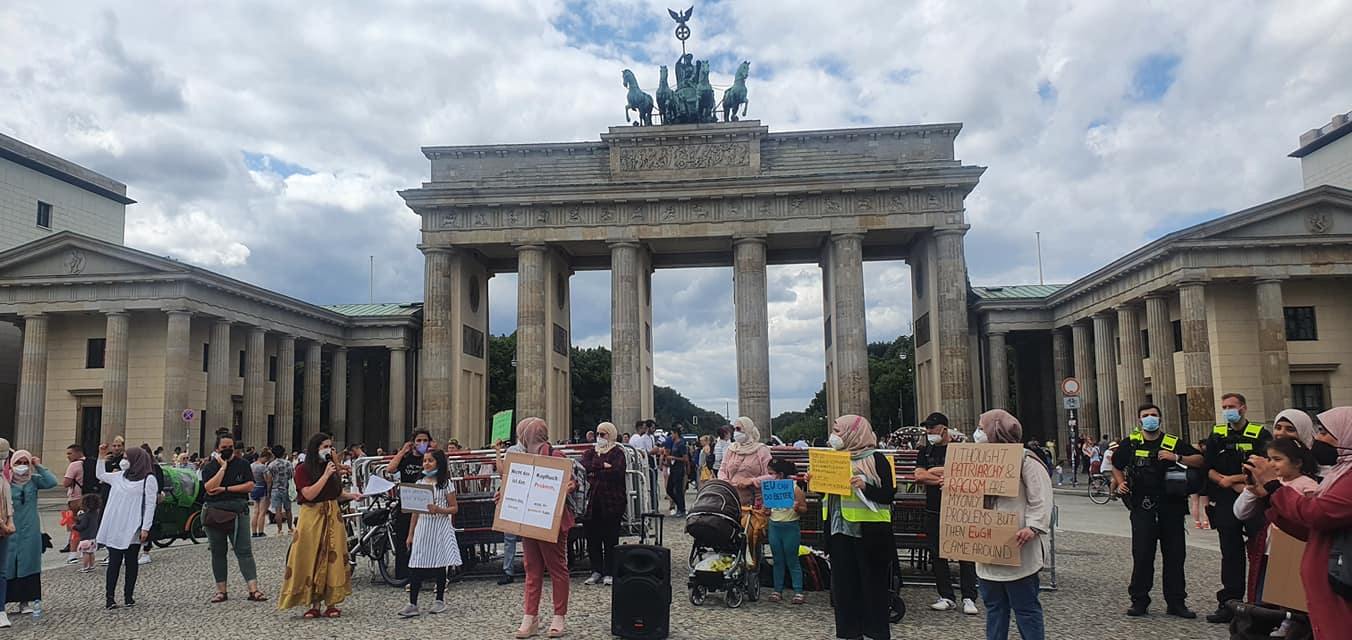
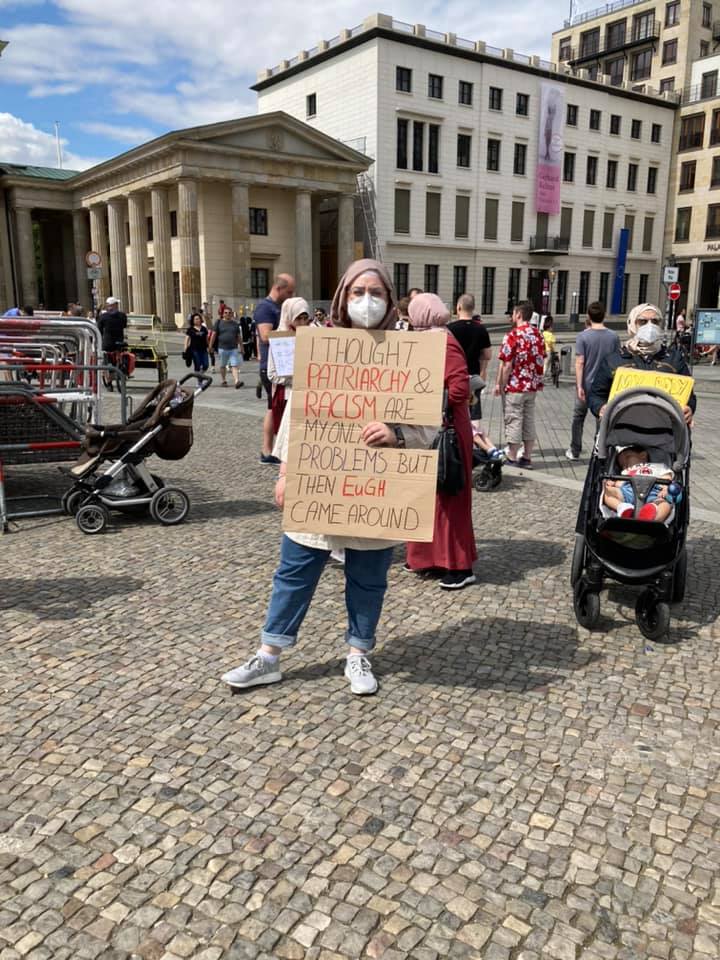
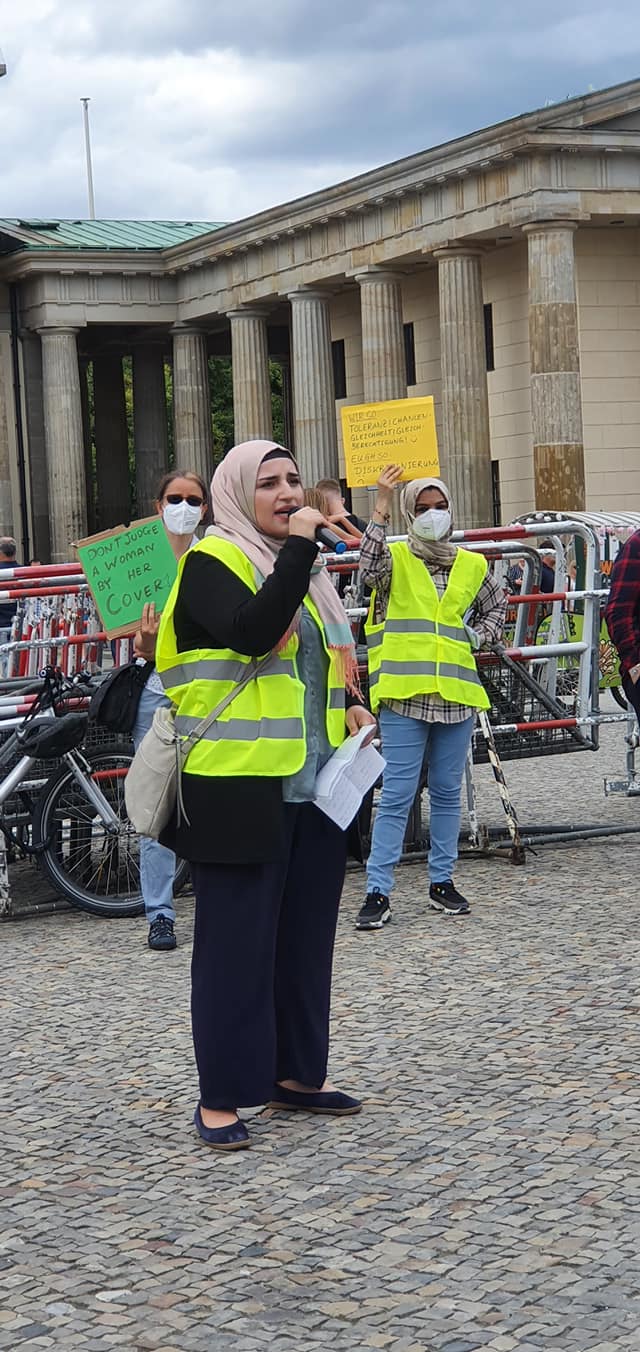
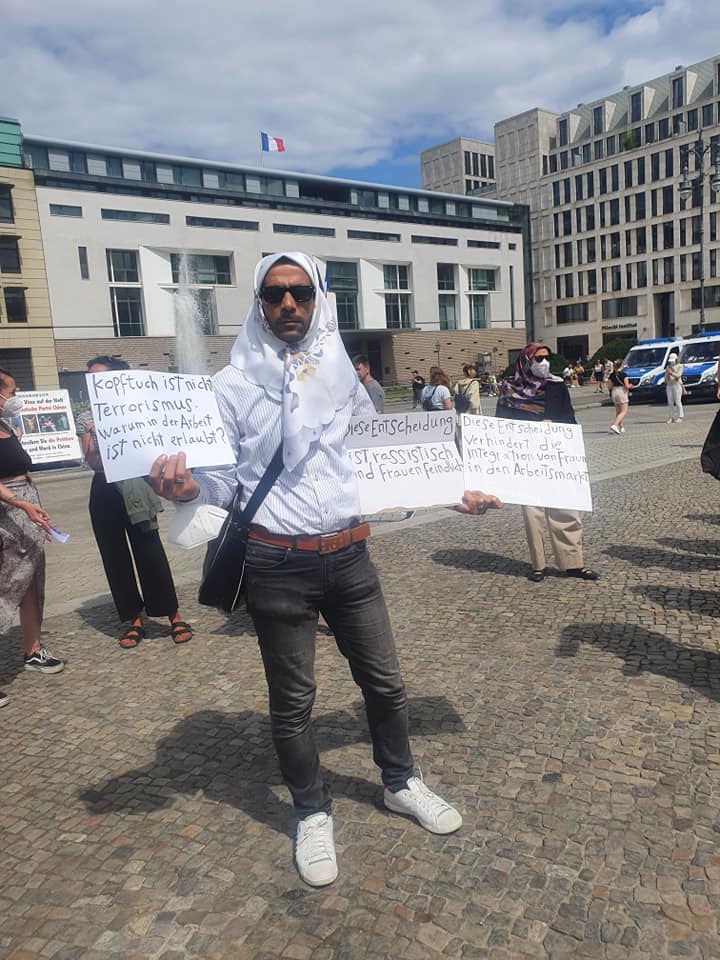
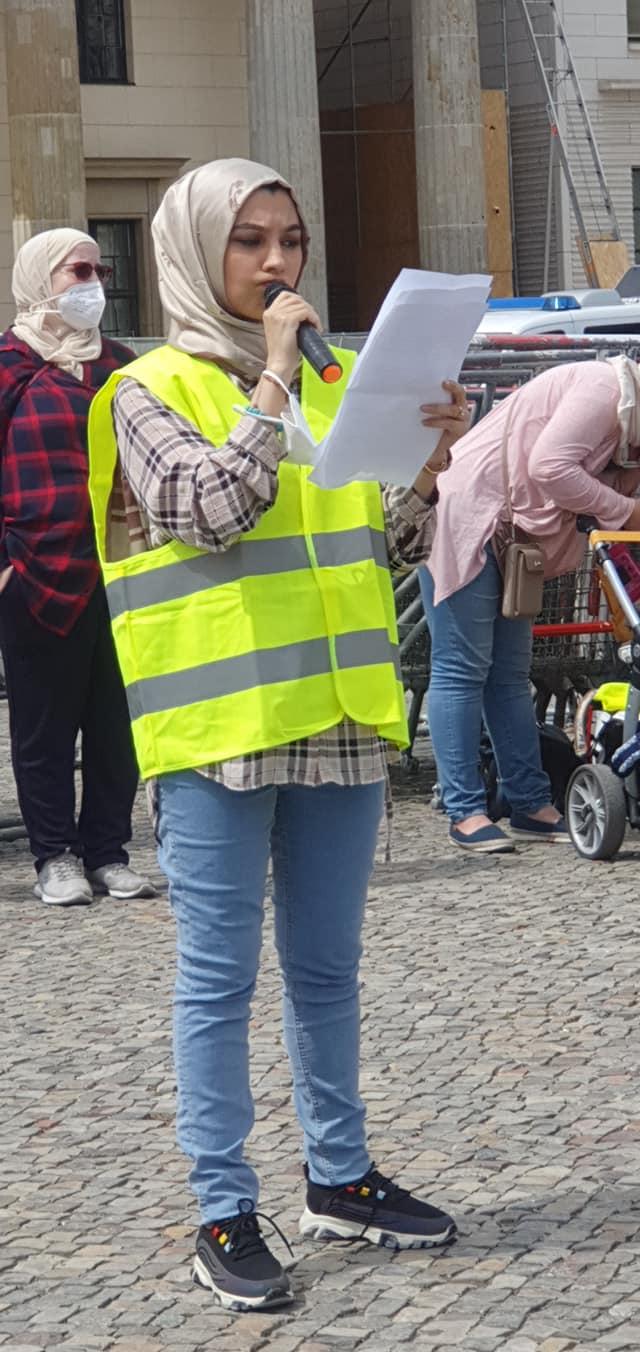
31st July, 2021 Brandenburger Tor.
The Left Berlin
31/07/2021







































For the right to decide what we wear – demonstration on Saturday 1st August at 1pm at Brandenburger Tor
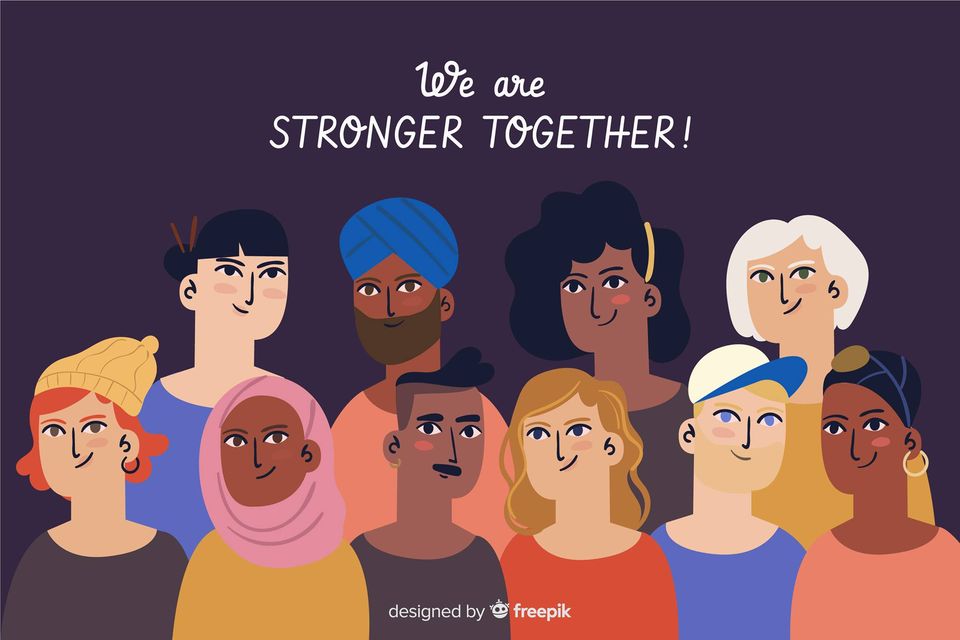
On July 15th 2021, the European Court of Justice ruled that workplaces can ban people from wearing visible forms of religious, political or philosophical expression in order to present a “neutral” image.
Visible forms of religious expression are not merely symbolic, in some cases they are an important component of religious practice. Workplaces that elect to ban these forms of expression do not merely ban items of clothing, they can actively prevent people whose religious practice involves visible forms of expression from accessing the workplace. Potentially excluded groups include Orthodox Jews who wear the kippah, payot, or who cover their hair with a wig, scarf or hat, nuns and monks who wear religious habits, Muslim women who cover their hair with a scarf and Sikh men who wear turbans.
Of those potentially affected, women whose religious practices involve covering their hair are most likely to be impacted. Covering the hair does not impede our ability to identify a person nor to interact with them, and various head coverings constitute professional attire. There are a number of reasons why women might choose to cover their hair and regardless of whether it is a religious practice or because a woman is undergoing chemotherapy, we believe women have the right to bodily autonomy. We question the legitimacy of the European Union’s decision to take this choice away from women and to transfer it to individual employers.
While various groups of people might be affected by the banning of visible forms of religious, political or philosophical expression, such bans have almost exclusively been implemented against Muslim women. The number of incidents concerning Muslim women being banned from the workplace for wearing a headscarf has increased in recent years with cases being brought before courts in France, Belgium, Germany and elsewhere in the EU. This coincides with a well-documented rise in anti-Islamic sentiment throughout Europe. With employers now able to implement bans of visible forms of religious expression for “objective” reasons such as “damage to the business caused by customer complaints” or “jeopardising company peace”, we believe the ruling has legitimised religious discrimination.
With this in mind, and contrary to the ECJ’s opinion that banning visible forms of religious expression can achieve “neutrality”, we argue that such gestures are inherently value-laden and an affront to diversity, gender equality and integration. We invite you to join us on 31.07.21 at 13:00, Brandenburger Tor to send a message to our European leaders that we reject divisive politics and do not support workplaces that elect to implement such bans. Let us instead celebrate our diversity, our differences, and create a Europe of which we can all be proud.
Demonstration – Protest Against New EU Ruling Which Allows Workplaces to Ban Visible Forms of Religious Expression. Saturday, 31st July, 1pm at Brandenburger Tor
Weekly news roundup from Berlin and Germany
The Left Berlin
30/07/2021

compiled by Ana Ferreira
NEWS FROM BERLIN
Berliners could get a third vaccination from September
Up to 200,000 Berliners could receive a Corona booster vaccination from September onwards. Initially, this is planned for the very elderly over 80 years of age, people in need of care, and for immunocompromised people. The booster is planned to be given no earlier than six months after the previous vaccinations. Doctors’ surgeries have also been called upon to ensure the vaccinations are administered to those in need of outpatient care. All others in the eligible groups, such as older people who are not in need of care, can also get vaccinated at their doctor’s office. Source: morgenpost
Schools start with rapid tests and vaccinations
Classes started again in Berlin and Brandenburg schools from Monday. For the first time, some schools also offered direct vaccinations. For those over the age of twelve, after the consent of the parents, they can be vaccinated in vaccination centers or by doctors in private practice. However, the special offers for schoolchildren may vary. It is expected that all students in Berlin’s vocational schools aged 16 and over will receive a vaccination offer in the next two months. The mobile vaccination teams would come every day to the schools for this purpose. Source: rbb
NEWS FROM GERMANY
German government U-Turn on Afghan refugees
Due to the dramatic deterioration of the security situation in Afghanistan, Germany will not deport any more rejected asylum seekers there for the time being. This decision shows a radical change of course once only a few days ago Germany has decided for continuing deportations to Afghanistan, at least for criminals. In the meantime, more Afghan employees of the army and the police, who have been granted visas, are coming to Germany. According to the Ministry of Defence in Berlin, around 1,700 of them, including dependents, have arrived in Germany by last Tuesday. Source: dw
Rail strike begins
The train drivers’ union and the Deutsche Bahn (DB) are in conflict. In June, the German Train Drivers’ Union, (GDL) declared that collective bargaining talks have failed, demanding an improved offer from the DB. This is affected by the Collective Bargaining Unity Act (Tarifeinheitsgesetz, TEG). According to the TEG, only the collective agreement of the union with the largest membership counts in a company. In most cases, this is the rival railway and transport union (EVG). Volker Krombholz, GDL Northeast District Manager, declared: “We have proven that we can strike for a long time.” Source: jW
Renovated Lübeck synagogue reopened
After more than six years of renovation, the Carlebach Synagogue was officially reopened on Thursday. The opening takes place in the year in which 1,700 years of Jewish life in Germany is being celebrated. The Carlebach Synagogue, named after its first rabbi Salomon Carlebach, was the target of two arson attacks in 1994 and 1995. Schleswig-Holstein’s Prime Minister Daniel Günther (CDU) spoke out in favour of not hiding Jewish life. “The Jewish faith needs places where it becomes visible – not on the margins, but in the midst of society.” Source: Süddeutsche
A new ruling could result in headscarves being banned throughout the EU. This is a serious attack on the rights of Muslim Women. Interview with Asha Faria-Vare

Hello Asha, thanks for talking to us. Could we start by you telling us a little about who you are.
Thanks for your interest in the demo! I am a British citizen from the Forest of Dean who has been living in Germany for about five years now. I’ve got a bit of an eclectic background: I’ve gone from being a trapeze artist in the circus, to being a Classical pianist, to running rap workshops in Palestinian refugee camps. Right now I’m studying my Masters in Kulturelle Musikwissenschaft in Göttingen but I also lead the UK team for a flight compensation company based here in Berlin. In terms of activism, I ran a gender equality blog when I was a teenager and also wrote and performed many a protest song (on my gee-tar) for all kinds of causes at all kinds of events. The upcoming demo will actually be my first time on the mic without a musical instrument.
On 15th July, the European Court of Justice passed a “neutrality” law banning certain clothing in the workplace. What exactly does the law say and who is affected?
So the decision passed by the European Court of Justice is not a law in itself, it clarifies questions about the interpretation of the EU Council’s existing framework for equal treatment in employment and occupation (Council Directive 2000/78/EC) and provides preliminary rulings in two cases brought before the court by Germany’s Federal Labour Court.
To summarise briefly, the court found that, while the existing EU framework prohibits both direct and indirect forms of discrimination, indirect religious discrimination may be justified under certain circumstances provided that there is a “genuine need” for the employer to prohibit visible forms of religious expression. Indirect discrimination, according to the court, occurs when all visible forms of religious expression are prohibited and no particular religion(s) are singled out. A genuine need might be “the wishes of customers” or, when it comes to education, the desire of parents to have their children supervised by people “who do not manifest their religion” while in contact with their children.
Regarding the two causes brought before the court, the court found the policy of one employer to prohibit large forms of religious expression impermissible as it targets specific religions and is therefore directly discriminatory. In the other case, the court found that the employer’s neutrality to be permissible insofar as it obliged people of all religions to refrain from wearing visible forms of religious expression. The court emphasised, however, that the employer must demonstrate a genuine need to implement such a policy, and must ensure that the prohibition in question is limited to what is strictly necessary according to the actual scale and severity of any adverse consequences the employer is seeking to avoid.
The decision of the court represents a major step backwards. While the original directive from the European Council talks of “apparently neutral” provisions, criterion or practices, the new decision fails to question whether or not neutrality policies are in fact neutral but rather broadly legitimises such policies provided that they are implemented by employers for “objective reasons”. That the so-called objective reasons named by the ECJ, such as customer complaints, are forms in which religious discrimination and racism is well-known to take, is suggestive of an intentional decision on the ECJ’s part to undermine the original intentions of the existing framework in favour of a distinctly right-wing interpretation.
In terms of who is affected, Muslim women who wear headscarves already bear the brunt of existing neutrality policies in Member States where legislation endorsing such policies already exists. Thus far, such policies have almost exclusively affected Muslim women; however, other religious minorities such as Orthodox Jews, Sikhs, and Hindus stand to be affected, particularly if member states, emboldened by the ECJ’s decision, begin to support such policies having previously taken a more tolerant approach towards religious practice and identity.
We’ve had a similar neutrality law in Berlin for just over 3 years now. How has that been going?
More trouble than it’s worth, I like to think. The State of Berlin first introduced its Neutrality Act in 2006 and has had difficulty implementing it ever since. It has at various times been ruled entirely unconstitutional, to some extent unconstitutional, and has seen multiple states of revision. In its initial stages, the Act, clearly targeted towards Germany’s growing Muslim population, excluded the prohibition of jewellery items such as crucifix pendants worn on necklaces. It was subsequently revised to include prohibitions on any visible form of religious expression and ultimately deemed constitutional under the condition that it is implemented in schools only when there is evidence of a “sufficiently concrete danger” to the school’s peace and state neutrality. In a city as diverse as Berlin, judges have generally taken a sceptical view towards the implementation of neutrality policies in schools as the implementation of such policies appears to pose a greater threat to peace than the absence of them, which makes a strong case for religious discrimination. Less diverse states, such as Nord Rhine-Westphalia, have had more success implementing neutrality acts.
The judgement says that it treats all religions equally. What’s wrong with that?
Of course all religions are not equally affected by the implementation of neutrality policies. For many Christians, the act of wearing a crucifix pendant is symbolic and removing it has no bearing on their religious practice. By contrast, many Muslims believe that covering the hair belongs to a broader concept of Hijab, or modesty, and is an obligatory requirement of the religion. This means that if a Muslim woman were to remove her headscarf, it would actively affect her ability to practice her religion. Muslim women are more likely to be forced out of the workplace as a result, which is extremely disheartening since they face enough difficulties accessing it on account of not only their religion but also their ethnicity and gender.
This is where the recent decision gets interesting: the ECJ acknowledges that religions for which visible forms of expression are religious precepts are more adversely affected by neutrality policies than others, it just doesn’t care. If we go back to the EU Council’s equal treatment framework, we find that it makes the same distinction between “direct” and “indirect” discrimination where discrimination is defined in terms of the action taken by the employer and not by the impact of these actions on employees. The adoption of this definition is less problematic here because both direct and indirect discrimination are ruled impermissible except under the strictest of circumstances. The framework allows member states to determine under which circumstances such discrimination might constitute a legitimate aim but, in light of the other provisions in the framework, it seems fairly obvious than any such circumstances should improve the situation of groups facing discrimination and certainly not legitimise harmful discrimination against them. In its totality, the equal treatment framework could and should be used as a tool for promoting religious tolerance.
What certain Member States (such as Germany) have done is exploit the freedom to define “legitimate aims” under which an employer might impose a policy of neutrality in order to create discriminatory legislation such as Berlin’s Neutrality Act. As we have seen in Berlin, some legislators went overboard and then had to work backwards by making the discriminatory elements less explicit in order to pass the legislation off as constitutional. Of course the original intentions of this legislation, to ban headscarves, has never changed, it has just been repackaged, but the questions surrounding its legitimacy have remained. This is essentially how two German cases ended up being referred to the ECJ for clarification.
What I find sad, or perhaps frightening, is that the ECJ was presented with a major opportunity to make good on the equal treatment framework, and they chose not to. Given the rise in far-right extremism and attacks against Muslims, the ECJ could have decided to take member states in another direction, but they opted instead to lean into it. The equal treatment framework also highlights the intersectional nature of discrimination but the ECJ did not consider gender based discrimination anywhere in their judgement. I cannot help but question their motivation and wonder if the European Union currently feels so unstable that it is scapegoating the increasing population of immigrants from outside the EU to maintain its legitimacy.
So far, neutrality laws have stopped women wearing headscarves from teaching or practising law, but not from cleaning schools and courts. Are double standards at work here?
Oh absolutely, if the position is something that the dominant culture affords a higher status to, a higher value, we feel affronted when we find people who do not look like us in that position and actively oppose it, legislate against it even. That’s when you hear “immigrants are stealing our jobs”. When it comes to menial positions or positions we attribute less value to, we barely pay attention to whether or not the person working is wearing a headscarf or not. The lower position is in keeping with the lower status we afford the person and, since it doesn’t ruffle our feather, we passively accept it.
Many supporters of neutrality laws say that by banning headscarves, they are protecting women as the headscarf is a symbol of women’s oppression. Is it that simple?
I feel like I’m a good person to answer this because I once joined my school’s debate team specifically to argue that the headscarf is oppressive and I remember clearly why I felt that way. I come from a place where we have a history of women being forced to cover up, so showing some skin represented, in my opinion, freedom from oppression. It logically followed that any requirement for women to cover must mean that they are oppressed by men. Simple, right?
Wrong. I tried to ignore the Muslim women telling me that Islam gave rights to women, convinced as I was that they are victims of the patriarchy, but after a while I decided to look into it (moving to a Muslim country helped). Turns out they were right, Islam really did give rights to women, substantial rights too given how women had been treated in the Middle East until that point. It has hardly surprising then, that when the Prophet Muhammed’s (SAW) wives, elevated members of Islamic society, began to wear headscarves, other women followed suit. It was a mark of pride, of prestige even. Within this context, the concept of hijab, when revealed to Prophet Muhammed (SAW), was readily accepted. The headscarf is not only a religious requirement then (a requirement of Allah, not of a man – that’s important), but it might also be regarded as symbolic of a religion that improved the status of women as well as a cultural practice. In Western societies, where women’s bodies are extremely hypersexualised, the headscarf represents for some Muslim women a position in opposition to this form of misogyny, it represents bodily autonomy.
To be honest, the headscarf is so ubiquitous in Muslim countries that at some point it’s like how men tend to have short hair while women tend to grow their hair. Many societies visibly distinguish between genders but you wouldn’t tell a woman she’s oppressed because she’s got long hair. When I visited the West Bank, I discovered that there is a headscarf for every personality type. There’s so much room for expression that even if someone is following a cultural norm, religious or not, it does not necessarily mean they are suffering. On the contrary, it might represent an important part of their identity, it might be the thing that makes them feel good about going out into the world.
I would like to mention that there are certain governments that exploit religious concepts, such as hijab, to oppress women. As a result, some women see that headscarf as symbolic of violence. It is important to understand that it really is complex and there are multiple truths, there are any number of ways in which the headscarf might be perceived. What is important is that we do not assume we know better than the person who chooses to wear it.
Many on the Left are proud atheists. Should religious matters like this concern socialists?
Yes, we should be opposed to all forms of oppression regardless of our personal beliefs. Oppression is a system that will continue to succeed if we allow some groups to be oppressed by the state and not others. In this case, many issues intersect including racism and sexism so if the religious aspect alone is not enough to get you on board, perhaps you can find another reason to support the cause. I believe the ECJ’s decision represents a strategic positioning towards the right and I would urge anyone on the left not to overlook this move on account of any personal religious (or even anti-religious) beliefs.
What actions are you organising and do you have plans for the future? How can people support you?
I expect I’ll do some networking at the demo and maybe some more activities will come out of it, but I have nothing lined up for the moment. I am pretty flat out with work and university so I took a step back from activism… at least I thought I did… but then things like this happen and I just can’t help myself.
Questions by Phil Butland. If you want more information about further activities, you can contact Asha on afariavare01@qub.ac.uk . We will continue to provide coverage on theleftberlin.com.
Protest Against New EU Ruling Which Allows Workplaces to Ban Visible Forms of Religious Expression: Saturday, 31st July, 1pm at Brandenburger Tor
Finally released in Germany, this Black Panther film is well worth watching
Phil Butland
29/07/2021
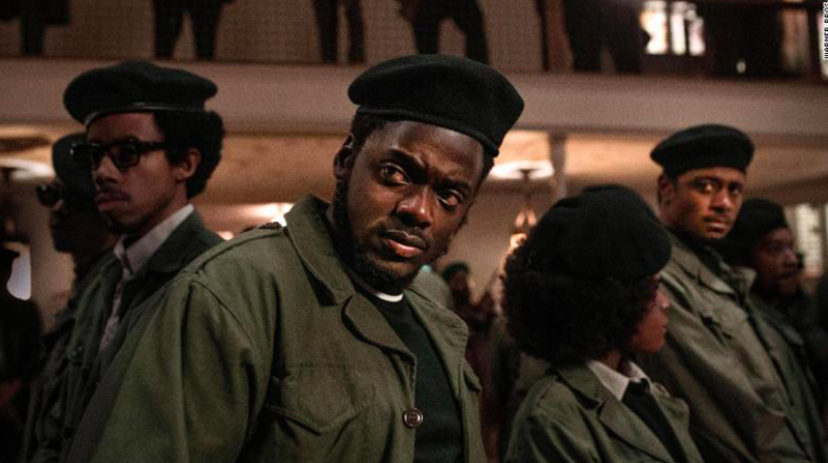
Chicago, 1968. Martin Luther King has just been assassinated and cities are being burned down by Black activists recognising that non-violence can only take you so far. The war in Vietnam is intensifying and body bags are returning home in increasing numbers – particularly in poor black communities. There is a political vacuum waiting to be filled.
Enter the Black Panthers with a peculiar mixture of Maoism, armed self-defence and community organising. Armed men (and some women) patrolling the racist police may be getting all the news coverage, but it’s the schooling and free meals for kids that are winning the Panthers widespread support in the community. Added to this, under the local leadership of the charismatic Fred Hampton, they are successfully approaching gangs – including gangs of Latinos and Whites – proposing joint action against a common enemy.
Daniel Kaluuya is excellent at giving us a grasp of Hampton’s oratory. Politically radical, but with a strong sense of a liberationist preacher. From the call and response to the background of insistent drumming a la The Last Poets or Gil Scott-Heron, his style is compelling, making the committed feel that they are really part of something and persuading ditherers to get involved.
But the Panthers are up against something more than random arrests and police violence. FBI head J Edgar Hoover is worried about their ability to unite resistance against not just the government but the “American way of Life”, particularly under Hampton’s leadership. He deploys a series of spies to infiltrate the Panthers, and to foster a feeling of mutual distrust.
Just in passing – the main acting credits go elsewhere, and deservedly so – but it was a neat move to cast a highly prostheticized Martin Sheen as Hoover. Sheen is a left-liberal activist and usually cast as one of the nice guys. This gives the foul racism coming out of Hoover’s mouth even more impact. He wasn’t just a right-wing manipulator – he really believed in what he was doing.
Bill O’Neil (LaKeith Standfield) is recruited as one of Hoover’s spies. O’Neil is a petty criminal, who we see in an early scene entering a bar with a fake FBI ID trying to scam one of the drinkers out of his car. He is caught and, with a prison sentence hanging over him, is “encouraged” to infiltrate the Panthers, where he gradually rises to become local head of security while passing on information to his FBI handler.
Much of the film is about the conflict felt by O’Neil towards people for whom he starts to feel affection, and possibly – this is left unclear – empathy for their political ideas. O’Neil is a coward who is proud of his ability to escape detection – a sly smile after he convinces a colleague about his innocence speaks volumes. But at the end of the day, he’s just another Black man who the FBI is using to destroy his own community. And he probably knows this.
There is another article to be written about how this film is leagues better than Aaron Sorkin’s self-indulgent Trial of the Chicago 7, in which Hampton plays a supporting role. And maybe I’ll write that article one day. Let’s just say that it is a rare occasion to see a film which not only shows sympathy for (a strand of) revolutionary socialism, but one that is also well made and acted.
So let me get to the little thing that is slightly perturbing me. I’m not really sure what the film is trying to say about the relationship between radical leaders and organised resistance. It is clear about what Hampton thinks. When he’s about to be put in jail (again), the comrades offer him money to flee to Cuba or Algeria. He rejects the money, saying that its better spent building a hospital in the community. What we do is much more important than specific individuals.
And yet the rest of the film seems to be pleading something different. When Fred is jailed for the first time, membership and support for the Panthers goes down – despite Hoover worrying that jail could turn him into a martyr. There is an interesting discussion about the extent to which the growth of the Panthers in Chicago depended on Chairman Fred’s individual charisma or on what the party structures were able to achieve (I would sit on the fence on this one, mumbling that the relationship is somehow dialectical).
But that’s not what films should be doing anyway – even films as radical as this one. The fact that an Oscar winning Hollywood film could even provoke such a discussion about revolutionary leadership sets this aside from almost all the competition. Judas and the Black Messiah doesn’t solve all the problems of the world, but within 2 hours it has a pretty good go.